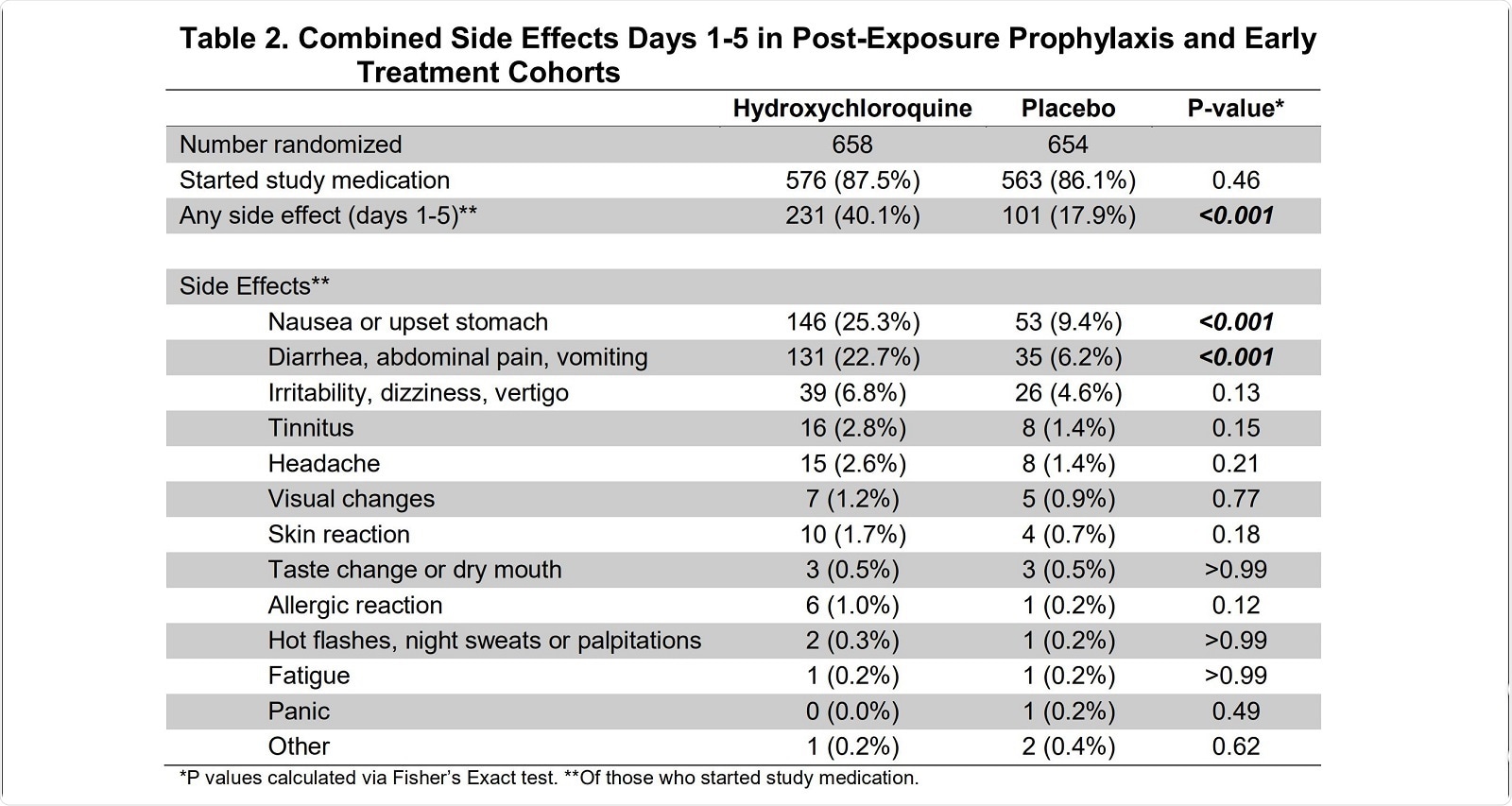According to new research published in the preprint server medRxiv* in July 2020, the use of hydroxychloroquine (HCQ) among outpatients in clinical trials, without high-risk factors for cardiac arrhythmia, is safe, with gastrointestinal side-effects being the most common side effects and no fatal adverse outcomes.

As the COVID-19 pandemic continues all around the world, with over 630,000 deaths so far, scientific research has focused on finding effective medications against the virus. A strong contender, right from the very beginning, has been HCQ, mainly because of the heavy backing given by political heavyweights.
Positive Profile, Negative Side Effects
HCQ has been demonstrated to have in vitro antiviral activity against SARS-CoV-2, the virus that causes COVID-19, and hinders its replication. However, correspondingly strong evidence of its activity in the treatment or prevention of this disease has not been found so far.
For this reason, the World Health Organization and several other health organizations are conducting studies on the safety and efficacy of this drug in both asymptomatic or mildly symptomatic cases, as well as sicker patients in hospitals.
Earlier research has reported an increase in the reported incidence of cardiac side effects with the use of HCQ and azithromycin in combination. This led to the revocation of the Emergency Authorization issued by the US Food and Drug Authority (FDA) for the use of HCQ in severely ill COVID-19 patients.
Instead, it said, “Hydroxychloroquine and chloroquine can cause abnormal heart rhythms such as QT interval prolongation and…ventricular tachycardia,” especially among those using HCQ with azithromycin or those who already had kidney or heart problems.
The issue with QT prolongation is the risk of ventricular arrhythmias. Most of these episodes in the context of HCQ use have been when the drug was used with another arrhythmogenic drug, used for an extended period or at excessive doses.
Long and Fruitful History of HCQ in Medicine
However, HCQ has been in clinical use, and when used as per the guidelines, for people without such issues, it is a useful drug in multiple disciplines and has been used in autoimmune rheumatic conditions. Baseline laboratory tests or ECG monitoring are rarely carried out in most cases.
However, health organizations have drawn attention to its ability to cause sudden deaths, especially when coupled with azithromycin. In most cases, safety issues have arisen in sicker, hospitalized patients who have severe disease, or other coexisting disease conditions, where multiple medications are taken at the same time.
Reasons for Increased Risk of Arrhythmia with HCQ in COVID-19
There are reasons to suspect that this may not reflect the normal course of events following the use of HCQ. For instance, the current virus may gain entry into cardiac cells and cause damage, and even arrhythmias, as reported in many cases.
Another potential cause of arrhythmias may be the elevated cytokines, especially in patients who already have heart damage. HCQ in current trials is also used at much higher doses than for the conditions it is currently approved for.
Finally, there may be significant disruption of normal electrolyte levels, which, in combination with kidney failure, makes the individual more prone to arrhythmias. This means that separate safety tests need to be carried out specifically for COVID-19 patients. HCQ is thought to be safer in outpatients with COVID-19 compared with hospitalized patients.
The Study: Safety of HCQ in COVID-19 Outpatients
The current study focuses on the safety evaluation of HCQ in outpatients, compiling data from three randomized controlled trials, where HCQ was used as pre-exposure prophylaxis, post-exposure prophylaxis, and early treatment, respectively. The researchers excluded all participants with contraindications to the use of this drug.
The study included approximately 2,800 individuals, with a median age of 40 years. About 60% of them were in good health. The researchers found that side effects were reported in around 85% of the participants, and 27% had one or more side effects related to the medication.
When the dosage frequency was compared, they found that about 30%, 35%, 30%, and 20% had side effects when the drug was administered daily, twice a week, once a week or when a placebo was used.
Important Side-Effects
Around 30% of patients reported side effects in the trials where the drug was administered post-exposure or post-infection.
The most common side effects reported were gastrointestinal, namely, stomach upset or nausea, diarrhea, vomiting, or abdominal pain. Overall, these symptoms were reported in a quarter of patients on daily dosage (about 20% and 15% with twice-weekly or weekly dosage), and in 10% of those on placebo.
However, in the post-exposure placebo vs. treatment groups, the rate of gastrointestinal side effects was comparable. The side effects were rated as tolerable and not requiring the cessation of medication.
Other reported side effects included lightheadedness or dizziness and allergic reactions.
There were only two instances of cardiac arrhythmias in the whole patient population, one of which occurred in the placebo group, the other in a patient taking HCQ twice a week. There were no reported deaths in this low-risk population.
Implications and Future Directions
The current study excluded hospitalized, presumably sicker, patients, who were mostly older. Most of the participants were health workers, and reasonably well-informed about health. Therefore, the safety of HCQ concerning its use in severely ill COVID-19 patients remains unclear.
Ongoing clinical trials can safely continue with research participants and regulatory bodies reassured as to the general safety of hydroxychloroquine when using appropriate exclusion criteria.”
*Important Notice
medRxiv publishes preliminary scientific reports that are not peer-reviewed and, therefore, should not be regarded as conclusive, guide clinical practice/health-related behavior, or treated as established information.
-
Lofgren, S. M. et al. (2020). Safety of Hydroxychloroquine among Outpatient Clinical Trial Participants for COVID-19. medRxiv preprint. doi: https://doi.org/10.1101/2020.07.16.20155531. https://www.medrxiv.org/content/10.1101/2020.07.16.20155531v1
https://news.google.com/__i/rss/rd/articles/CBMidmh0dHBzOi8vd3d3Lm5ld3MtbWVkaWNhbC5uZXQvbmV3cy8yMDIwMDcyNy9DbGluaWNhbC1UcmlhbHMtb2YtSHlkcm94eWNobG9yb3F1aW5lLWluLUNPVklELTE5LU91dHBhdGllbnRzLUFyZS1TYWZlLmFzcHjSAXpodHRwczovL3d3dy5uZXdzLW1lZGljYWwubmV0L2FtcC9uZXdzLzIwMjAwNzI3L0NsaW5pY2FsLVRyaWFscy1vZi1IeWRyb3h5Y2hsb3JvcXVpbmUtaW4tQ09WSUQtMTktT3V0cGF0aWVudHMtQXJlLVNhZmUuYXNweA?oc=5
2020-07-27 11:44:00Z
CAIiELbMJ5l5hJbm1JI9mCO2wjcqMwgEKioIACIQZdRflS9INK7zM5FkBi3R3CoUCAoiEGXUX5UvSDSu8zORZAYt0dwww8TIBg
Bagikan Berita Ini














0 Response to "Clinical trials of hydroxychloroquine in COVID-19 outpatients are safe - News-Medical.Net"
Post a Comment